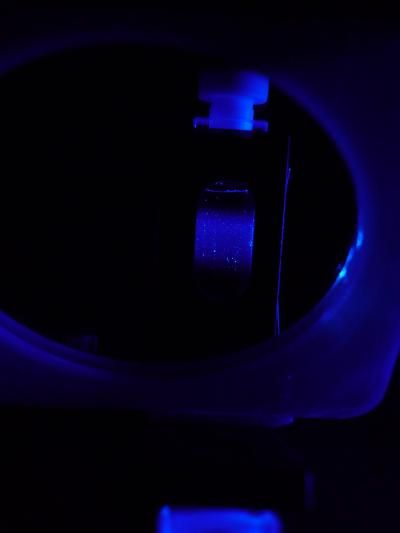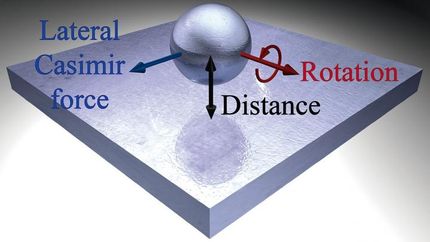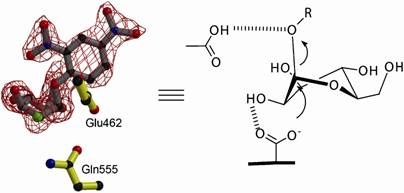University of Leicester researchers discover new fluorescent silicon nanoparticles
Research may ultimately track the uptake of drugs by the body's cells
Researchers in the Department of Physics and Astronomy at the University of Leicester have developed a new synthesis method, which has led them to the discovery of fluorescent silicon nanoparticles and may ultimately help track the uptake of drugs by the body's cells.

This is a suspension of nanoparticles in a quarz-glass cell exposed to ultra violet light. The nanoparticles emit deep-blue fluorescence.
Dr Klaus von Haeften, University of Leicester
Dr Klaus von Haeften explained: "A key advantage of the new method is the independent control of the nanoparticles' size and their surface properties. The method is extremely versatile and produces the fluorescent suspensions in one go. The findings may revolutionise the performance of electronic chips while satisfying the increasing demand for higher integration densities."
The nanoparticles contain just a few hundred silicon atoms and their fluorescence were discovered after mixing them with water. This resulted in stability in fluorescence intensity over more than a three month period.
An interdisciplinary research project with the Department of Chemistry, led by Professor Chris Binns and Dr Glenn Burley, also incorporates this new method of synthesis. They are aiming to link nanoparticles to drugs involved in the diagnosis and treatment of cancer.
Professor of Nanoscience in the Department of Physics and Astonomy, Chris Binns said: "Nanotechnology, that is, the use of structures whose dimensions are on the nanometre scale, to build new materials and devices, appears to hold the key to future developments in a wide range of technologies, including materials, science, information technology and healthcare."
Dr von Haeften added: "The approach developed in Leicester could be a key step towards the production of a variety of biomedical sensors that could help track the uptake of drugs by cells."
The benign nature of silicon also makes the nanoparticles useful as fluorescent markers for tagging biologically sensitive materials. The light from a single nanoparticle can be readily detected.
Original publication: Anthony Brewer and Klaus von Haeften; Applied Physics Letters 2009
Most read news
Topics
Organizations
Other news from the department science

Get the analytics and lab tech industry in your inbox
By submitting this form you agree that LUMITOS AG will send you the newsletter(s) selected above by email. Your data will not be passed on to third parties. Your data will be stored and processed in accordance with our data protection regulations. LUMITOS may contact you by email for the purpose of advertising or market and opinion surveys. You can revoke your consent at any time without giving reasons to LUMITOS AG, Ernst-Augustin-Str. 2, 12489 Berlin, Germany or by e-mail at revoke@lumitos.com with effect for the future. In addition, each email contains a link to unsubscribe from the corresponding newsletter.


























































